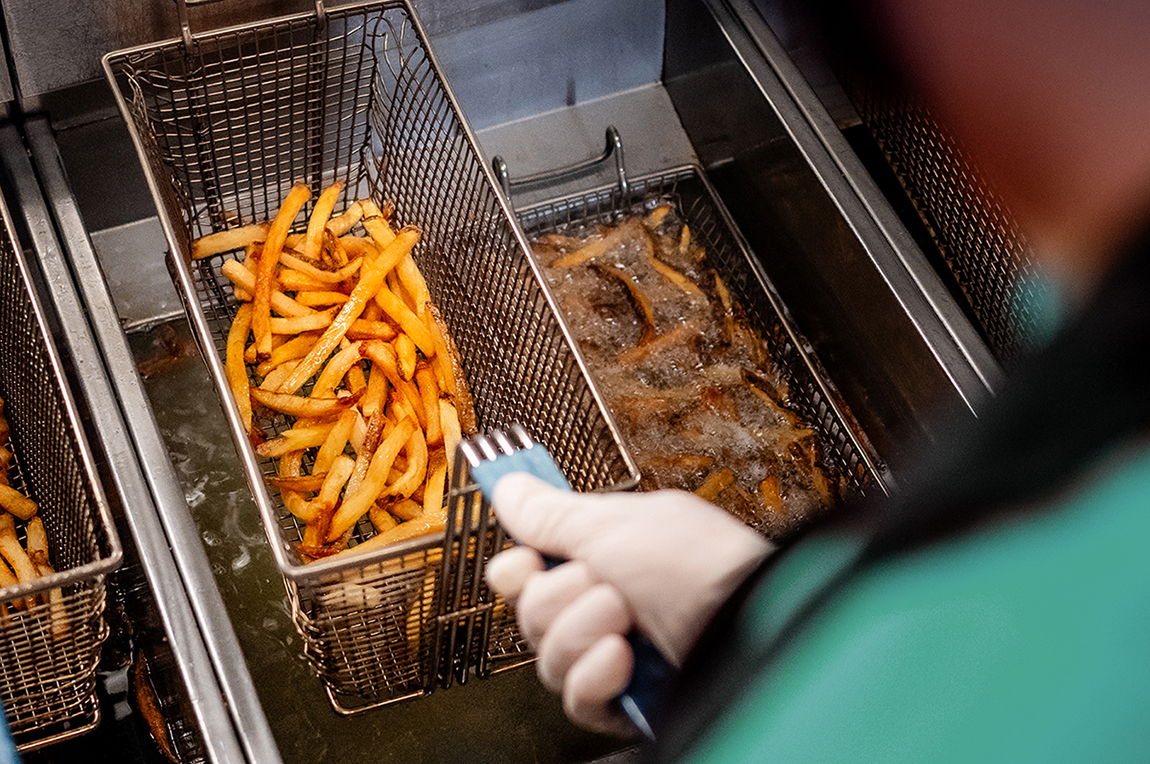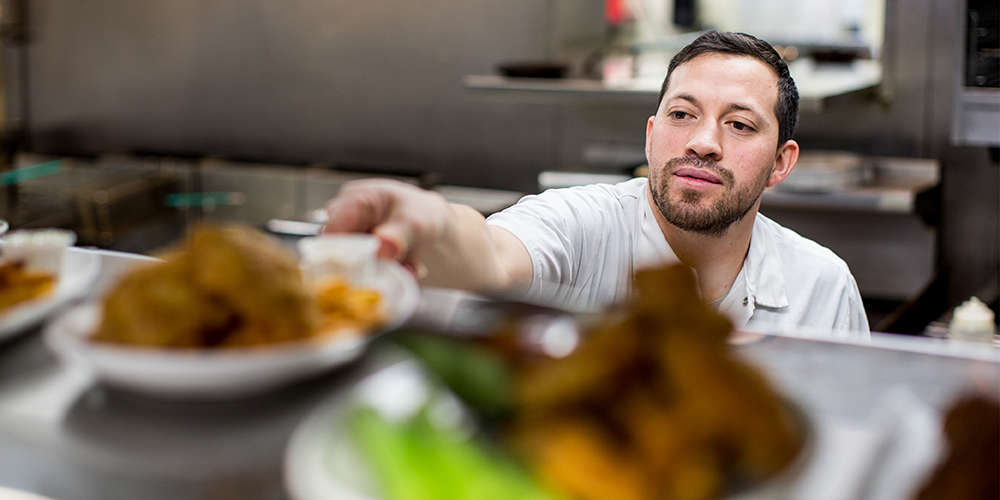The grocery industry has had to pivot almost daily to deal with pandemic-related issues. Stock shortages because of supply chain breakdowns and manufacturer unpreparedness for unprecedented demand. Long lines at checkouts as customers “panic shop” and fill their carts with much more than they need or can use. The need, as a result, to limit the amount of any single item consumers can purchase at one time. More Instacart and other delivery grocery shoppers in your stores, and more in-store staff delegated to curbside pickup or delivery, as customers are choosing contact-less, digital shopping over the in-store experience.
For grocers, it’s not only a matter of consumer and supply chain issues. Employee safety and retention go hand in hand, and have always been important to the grocery industry. Now they’re a top priority.
The United Food and Commercial Workers International Union (UFCW), which is the country’s largest food and retail union, has been on the front lines of employee safety since the pandemic hit. It has used its voice to demand transparency in tracking COVID-19 in the food industry, calling for a national public registry of infections. According to the UFCW, more than 14,300 grocery workers have been infected with the virus, with 103 deaths, as of Aug. 27, 2020. Broadening those statistics to include the food industry as a whole, some 36,000 food workers have been infected, with 250 deaths as a result.
Those numbers underscore what many grocers already know: Safety is the paramount concern.*
Keeping employees and customers safe
Grocery giant Kroger, based in Cincinnati, has been on the forefront of safety during this pandemic, implementing measures recommended by OSHA for employee safety and going a step further to ensure customer safety as well. Some of these, highlighted on the Kroger website, include:
- Plexiglass barriers at checkout lanes, the pharmacy and in-store Starbucks locations.
- Increased cleaning and disinfecting of checkout lanes and shopping carts.
- Encouraged physical distancing of customers when waiting for checkout and while shopping.
- Limited quantities of high-demand items.
- Dedicated shopping hours for senior citizens.
- Customer capacity limits monitored by QueVision technology.
- Mobile app benefits to encourage customers to pay via the app.
- Protective face masks required for all employees and customers.
- Free curbside pickup with minimal contact.
- Digital receipts to minimize contact with paper and with employees.
- No contact home delivery, with groceries left by the door.
- Employee temperature checks and other health screenings before each shift.
In addition to these safety precautions, some grocers are turning to automated solutions for grocery stores to reduce manual tasks and improve employee satisfaction. All of these measures are designed to minimize contact among employees and customers, increase protection against the virus, and lessen the likelihood of transmission both in store and via delivery or pickup. They’re a necessary part of the job today, and will likely remain in place for the foreseeable future. The UFCW is encouraging employees who feel their employers are not putting their safety first to contact them and report it.
However, despite putting these measures in place to safeguard employees, challenges still exist for grocers, especially when it comes to employee morale and retention.
A new report from the Washington Post paints a grim picture. Morale in the grocery industry is at an all-time low. The “hazard pay” hourly boost in salary from Kroger, Meijer and Publix, among others, has now run out. Employees are tasked with additional duties like sanitizing carts and cashier belts between uses. New impediments like wearing masks and gloves for their entire shift make it more difficult and uncomfortable for employees to do their jobs. And many times, employees are expected to enforce mask mandates with customers, who have become abusive and even violent when challenged. Many employees do not have health coverage or PTO, so taking days off to quarantine after becoming exposed to the virus or having developed symptoms means financial hardship and the possibility of losing their job.
All of this can lead to employees simply deciding it’s not worth it to keep an increasingly difficult and taxing minimum-wage job. Even when we’re not in the midst of a pandemic, employee retention can be difficult. But it’s vital to any company’s bottom line. The costs of hiring, training, downtime during hiring and training, extra shifts for existing employees to cover that opening until it’s filled, and other facets of the recruitment and hiring process can cost a company as much as a quarter of an employee’s yearly salary. With the grocery industry’s razor-thin margins, that’s a big hit.
Tactics for employee retention
What’s the best way for the grocery industry to retain employees in this time of COVID? Here are some measures companies are taking now:
Updated sick leave policies. According to Brookings, before the pandemic, the majority of grocery workers didn’t receive paid sick leave from their employers. As a result of public outrage and employee pressure, many large employers have updated their policies to allow for worker sick leave. Safeway, Kroger, Walmart and others offer 14 days of paid sick leave for employees with a COVID-19 diagnosis. But, it has been difficult to get tested, and the results can take days.
Offers of extended leave to high-risk employees. These include older workers, immunocompromised people, those with underlying conditions or who are caregivers for elderly family members. According to Brookings, offering these employees extended leave is not just the right thing to do, it’s good for business and employee morale.
Reinstating the “hazard pay” salary increase and bonuses. Being a frontline grocery employee is still a hazardous job right now. But it’s not just exposure to the virus. Doing extra work like sanitizing carts and belts and policing customer mask use for the same pre-pandemic hourly wage is contributing to low employee morale. Kroger and Walmart gave employees $300 bonuses, while Safeway, Shoppers, Whole Foods and Target raised their pay by $2 per hour.
Mental health options. This pandemic has pulled the rug out from under all of us, and many are dealing with mental health concerns as a result. Even if it’s just a list of support groups in your area, the empathy will go a long way. Walmart is encouraging its workers to take advantage of its mental health benefits, including teletherapy, meditation classes and peer support.
Staggered shifts and increasing breaks. Standing behind a cash register or stocking shelves wearing a mask all day can be tiring and taxing. Allowing employees more frequent breaks is one way to help alleviate that added stress. But it’s not just about that. According to the Department of Health, staggering breaks and shifts is also a way to increase physical distancing and keep employees safe.
Retention in any economy is a challenge for the grocery industry, but in this uncertain world, it’s even more difficult. It boils down to making people feel valued and appreciated by showing you empathize with what they’re dealing with on the front lines every day.
*Nothing herein constitutes legal advice or other formal direction or guidance of any kind. The information offered herein is offered for general information purposes only.



